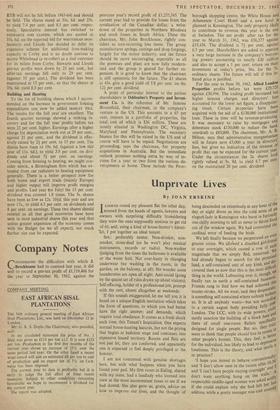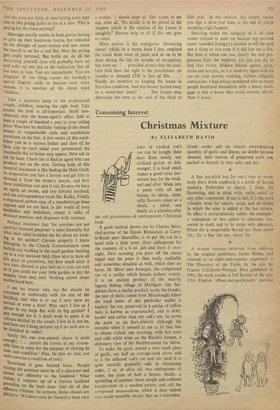Unprivate Lives
By JOAN ERSKINE
ILOOKED round my pleasant flat the other day, wrested from the hands of agents, lawyers and owners with surprising difficulty `(considering they were the ones supposedly anxious to get rid of it), and, using a kind of house-hunter's Identi- lit, I put together an ideal tenant.
Sex: preferably neuter. Non-drinker, non- smoker, stone-deaf (so he won't play musical instruments, records or radio). Non-washer (judging from the times the bathroom is available or the water hot). Not over-hasty in changing underwear (no washing in the room, in the garden, on the balcony, at all). No wonder some launderettes are open all night. Anti-social (going by the quaint set of rules drawn up about visitors). Self-effacing, holder of a professional job, prompt with the rent, absent altogether at weekends.
If this sounds exaggerated, let me tell you it is based on a unique English institution which takes the form of questions, to which you had better have the right answer; and demands, which require total obedience. It comes as a fresh shock each time, this Tenant's Inquisition. One expects normal house-hunting hazards, but not the prying that begins at bedsitter stage and continues into expensive leased territory. Rooms and flats are not just let, they are conferred, and apparently one is expected to feel deeply privileged at the honour.
I am not concerned with genuine shortages here, but with what happens when you have found your pad. My first room in Ealing, shared with my sister, had a landlady who loomed into view at the most inconvenient times to see if we had dusted. She also gave us, gratis, advice on how to improve our lives, and the thought of being descended on relentlessly at any hour of the day or night drove us into the cold arms of an elegant lady in Kensington who burst in furiously one chilly morning to tell us never to throw food out of the window again. We had committed the cardinal error of feeding the birds.
We left finally because we perpetrated an eyelid greater crime. We alloved a disabled girl-frierli. to stay overnight, which caused a row of sue' ° magnitude that we simply fled, unnerved- ‘V, had already begun to search for the promise' land, a self-contained unit of any kind, and dist; covered then as now that this is the most didell thing in the world. Labouring over it, though' Wt finally ran to earth a self-contained basemen.' Friends rang to find how we had achieved this master-stroke. All we want, said they desPeratelYs' is something self-contained where nobody bothers us. It is all anybody wants—but riot accordio; to a certain august body presiding fatlY °ilvid London. The LCC, with its wide powers, p0 d surely sanction the building of a block here ally rily there of small one-room flatlets sPecific3 tre designed for single people. But no, they in seem to think that people should live in roonls other people's houses. This, they feel, is bet!ei- for the individual, less likely to lead to depress: loneliness.loneliness, This is the theory, and what sPlAs I in practice? ally' hope you intend to behave convention 30, and 'I don't allow men in the rooms after 1°'d an, and can't have people staying overnight'A don't want anything hung on the respectable middle-aged woman was asked acidly t if she could explain why she had left her last address, while a pretty teenager was told severely that she must not think of entertaining more than one or two young ladies to tea at a time. Who is paying for the room anyway?
Marriage usually results in both parties having to give up their hard-won rooms, but consoled by the thought of more money and new status the search is on for a real flat. Now the prying gets really personal. But battle on, do all the decorating yourself (you will probably have to) and wake up one day to the realisation that all has been in vain. You are untouchable. You are pregnant. If one thing causes the landlady's special English smile to become even more remote, it is mention of the dread word `children.'
Take a quantum jump to the professional couple, childless, wearing the right look. Like accent, the look is all-important. Stroll non- chalantly into the house-agent's office. Add at least a couple of hundred a year to your ceiling price. Woo him by dutifully visiting all the dwarf houses at unspeakable rents and scandalous premiums on his lists, A few weeks of this estab- lishes you as a serious looker and then (if he likes you or can't stand your persistence) the reasonable flat or house may appear. Now ask to see he lease. I have yet to find an agent who can produce one on the turn. Getting hold of this essential document is like finding the Holy Grail. In desperation you hire a lawyer and get him to demand it from the owner's lawyer, and how these middlemen can spin it out. So now we have an agent, an owner, and two lawyers involved, and the correspondence reads like Kafka. Finally a dog-eared carbon copy of a standard-type lease appears and we are back in the world of nosy landladies and bedsitters, except it talks of demised premises and dispenses with commas. Perhaps insistence that 'the premises are not used for immoral purposes' is mere formality but what idiot mind included the bit about no wash- ing in the garden? Certain property I know belonging to the Church Commissioners even forbids any washing in the small gardens backing on to a vast enclosed field. How nice to have all this grass to yourselves, but how much nicer if You were allowed to play ball on it (you are not) Or if you could use your little garden to dry the nappies (you may not). Nothing sacred about motherhood here.
I see no reason why my flat should be curtained in conformity with the rest of the building, and who is to say I may have no animal or even a bird? Why can't I live as I Please in my large flat with its big garden? I PaY enough for it. I don't want to paint it in colours decided by the owner. I live in it, not he, be how can I hang pictures up if no nails are to ee knocked in walls? Surely this one ever-present clause is quite cnough: . permit the Lessor at any reason- able time to enter for the purpose of viewing its state and condition.' Fine, let him do that, not make miseries a condition of entry. Sometimes it goes beyond farce. People visiting the premises must be of a character and nature not offensive to the landlord.' What visions it conjures up of a furious landlord Pounding on the back door. 'Get rid of that nifensive Chinese,' he screams. Some clauses are plaintive. 'Windows must be cleaned at least once a month.' I should hope so. One wants to see out, after all. 'No article is to be placed in the window which in the opinion of the Lessor is unsightly,' Heaven help us all if this one goes to court.
More serious is the ambiguous `decorating clause' which, in a recent lease I saw, required the usual three coats of paint and so on to be done during the last six months of occupation, but went on : `. .. provided always that the land- lord shall have the right in the penultimate six months to demand £250 in lieu of this. . . Hardly an incentive to keeping the house in first-class condition. And this beauty tucked away in a seven-year lease? '. . The Lessor may determine the term at the end of the third or fifth year.' In my opinion, this simply means you sign a three-year lease at the end of which anything might happen.
Smarting under the indignity of it all (one owner refused to meet me because my married name 'sounded foreign') I decided to tell the next one a thing or two even if it did lose me a flat. But here is where one sees clearly the real pro- gression from the bedsitter, for just you try to find that owner. Hidden behind agents, secre- taries and lawyers, he is a shadowy figure with an eye on your morals, washing, visitors, religious convictions. I had always wondered why so many people burdened themselves with a heavy mort- gage to buy a house they could scarcely afford. Now I know.





























 Previous page
Previous page